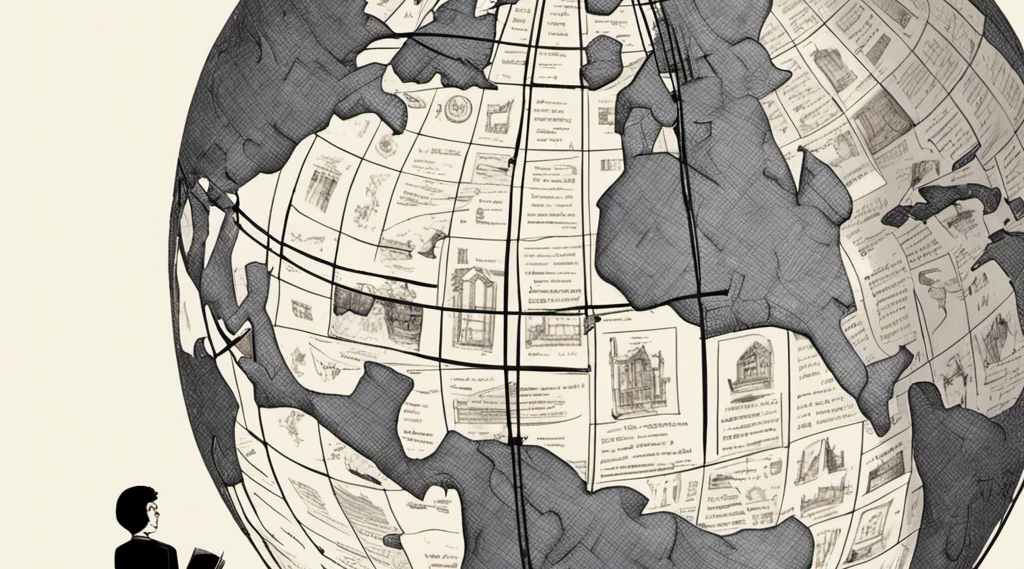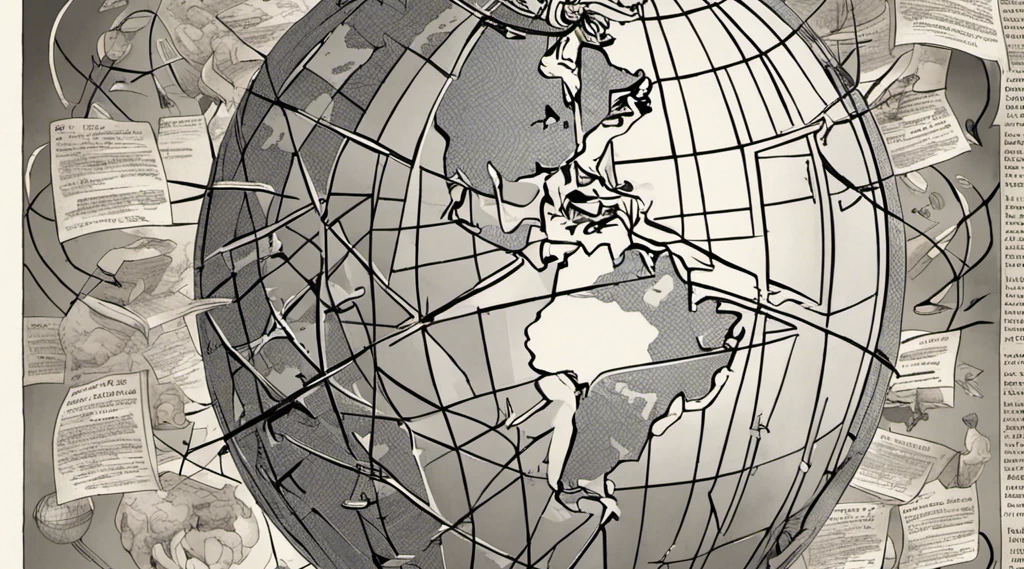The Information:Unraveling the Secrets of Knowledge
"The Information" by James Gleick is a comprehensive exploration of the history, science, and impact of information, illuminating its significance in shaping human culture and understanding the world.
Chapter 1 What’s Information about
"The Information: A History, a Theory, a Flood" is a non-fiction book written by James Gleick. Published in 2011, it explores the concept of information from various perspectives and disciplines, including mathematics, physics, biology, and computer science.
The book takes readers on a journey through time, tracing the development and evolution of information from prehistoric times to the present digital age. It delves into the significance of information in human civilization and its impact on the way we understand the world and communicate with each other.
Gleick discusses key figures who have shaped our understanding of information, such as Claude Shannon, the pioneering mathematician who laid the foundations of modern information theory. He also examines how information has influenced various fields, including genetics, linguistics, and artificial intelligence.
"The Information" explores topics like the history of writing and language, the invention of the printing press, telegraphy, cryptography, and the rise of the internet. It delves into the challenges and opportunities that arise as we navigate an increasingly interconnected and information-rich world.
Overall, the book offers a thought-provoking exploration of the many dimensions of information and its profound impact on our lives, providing historical context, scientific explanations, and philosophical insights along the way.
Chapter 2 Is The Information A Good Book
According to reddit comments on The Information, "The Information" is widely regarded as a highly influential and well-regarded book in the field of information theory and its impact on society. Written by James Gleick, it delves into the history and significance of information from multiple perspectives, covering topics such as communication, coding, cryptography, and more. If you have an interest in understanding how information shapes our world, this book may be worth exploring.
Chapter 3 The Information Abstract
In this article, we delve into a comprehensive summary of the book "The Information" by James Gleick. The captivating exploration of how information shapes our world, Gleick unravels the history and significance of communication and knowledge. From the invention of writing and the printing press to the digital revolution, "The Information" offers profound insights into the power and complexities of information in society. Join us as we uncover the remarkable journey through time and ideas, as presented in James Gleick's thought-provoking masterpiece.
Chapter 4 The Information the Author
James Gleick is an American author and science historian. He was born on August 1, 1954, in New York City. Gleick has written extensively on various scientific topics, particularly focusing on the intersection of science and technology with society and culture.
One of his most well-known works is "Chaos: Making a New Science," published in 1987. This book introduced the concept of chaos theory to a broader audience and explored its implications for understanding complex systems. It became a bestseller and established Gleick as a prominent science writer.
In addition to "Chaos," Gleick has written several other notable books. His 2011 work, "The Information: A History, a Theory, a Flood," delves into the history and significance of information, covering topics such as communication, cryptography, and the digital revolution. Another notable book by Gleick is "Genius: The Life and Science of Richard Feynman," a biography of the renowned physicist Richard Feynman.
Gleick's writing style combines scientific rigor with engaging storytelling, making complex concepts accessible to a wider audience. He has received numerous awards for his contributions to science writing, including the National Book Award and the Royal Society Winton Prize for Science Books.
Overall, James Gleick is a highly regarded author who has made significant contributions to popularizing scientific ideas and exploring their impact on our world.
Chapter 5 The Information Meaning & Theme
1. The Information Key Meaning
The key meaning of this book can be summarized as follows:
History of Information: The book delves into the historical development of information, from ancient civilizations to the modern digital age. It examines how humans have sought to capture, store, and transmit information throughout time.
Theory of Information: Gleick discusses the theoretical foundations of information, drawing upon the works of renowned scientists and thinkers like Claude Shannon and Alan Turing. He explains concepts such as entropy, encryption, and computation, which help us understand the fundamental nature of information.
Information Overload: The book addresses the idea of an "information flood" in contemporary society. With the advent of the internet and digital technologies, we are exposed to an overwhelming amount of information. Gleick explores the consequences of this overload and how it affects our cognition, decision-making, and sense of self.
Bridging Disciplines: "The Information" draws connections between various fields of study, including mathematics, linguistics, biology, and computer science. By examining these disciplines through the lens of information theory, Gleick reveals their interconnectedness and shows how information plays a critical role in shaping our understanding of the world.
Overall, the key meaning of "The Information: A History, a Theory, a Flood" lies in its exploration of information as a concept, its historical significance, and its immense influence on human society. It highlights the challenges and opportunities arising from the abundance of information in the digital age and prompts readers to critically reflect on the role of information in their own lives.
2. The Information Key Theme
The theme for the book "The Information" by James Gleick is the profound impact of information on our world. Gleick explores the history, science, and cultural significance of information, delving into how it has shaped human civilization and influenced various fields such as communication, technology, mathematics, and biology.
Key aspects of this theme include:
- Information Theory: Gleick discusses Claude Shannon's revolutionary theory of information, which laid the foundation for modern digital communication systems. He explores how this theory transformed the understanding of information as a measurable quantity, transcending its previous association with meaning or semantics.
- Communication Revolution: The book examines the transformative power of new means of transmitting and accessing information, from the invention of writing and printing to the advent of the telegraph, telephone, and ultimately, the Internet. It highlights how these developments have revolutionized human communication, influencing knowledge dissemination, social interactions, and even personal identities.
- Information Overload: Gleick explores the challenges posed by the exponential growth of information in the age of digital technology. He addresses the concept of information overload and its implications for individuals and society, including issues of attention, filtering, and decision-making.
- Information and Order: The book delves into the relationship between information and order, drawing connections between the science of information and fundamental concepts like entropy and complexity. Gleick provides insights into the role of information in shaping natural systems, evolution, and the emergence of complex patterns.
- Cultural Impact: Throughout the book, Gleick explores how information has left an indelible mark on various aspects of culture, including language, literature, art, and music. He demonstrates how different societies have grappled with the concepts of information and communication through historical examples, literary references, and philosophical arguments.
Overall, "The Information" explores the profound significance of information in shaping our past, present, and future, highlighting its role as a driving force behind technological advancements, scientific discoveries, and societal transformations.
Chapter 6 Exploring Digital Archives on The Information
If you are searching for "The Information" in various formats and concise summaries, we suggest exploring platforms like Bookey. They offer an extensive collection of books in multiple formats along with short summaries that give a quick glimpse into each book's content. This proves especially advantageous for individuals seeking a comprehensive overview but who prefer not to invest excessive time. For a more visual approach to the book, we highly recommend browsing YouTube, where you can discover a plethora of video material on The Information, as well as supplementary presentations related to the book, such as The Theory of Information, which provide deeper insights and informative content. However, we regret being unable to provide a direct PDF version of The Information. The primary objective of this post is to acquaint you with the value of the book and present alternative reading options. Happy reading!
Chapter 7 Quotes of The Information
The Information quotes as follow:
- "Information is what our world runs on: the blood and the fuel, the vital principle."
- "It is a deeply human question, one that asks why we seek to capture, manipulate, and understand information — to turn it into knowledge."
- "We are all nodes on a network, and the circuits of the mind are like circuits of copper wire or optic cable."
- "We sense an infinite frontier, but also a strange, confining straitjacket."
- "Language itself is information, a code we learn as children and process as adults."
- "In some sense, information could be no more than the pattern in a stream of molecules or electrons or photons."
- "There is no such thing as too much information, only the wrong kind."
- "Today's digital revolution is a cultural and social phenomenon, as well as a technological one."
- "The data we seek creates the world we perceive."
- "Shannon’s theory was not about meaning; it was about carrying messages through a noisy channel."
Please note that these quotes are extracted from the book, and their accuracy may depend on different editions or translations.
Chapter 8 Similar Books Like The Information
If you enjoyed reading "The Information" by James Gleick, you might be interested in exploring other books that delve into related topics or present similar themes. Here are a few recommendations:
- "The Idea Factory: Bell Labs and the Great Age of American Innovation" by Jon Gertner: This book explores the history of Bell Labs and its role in shaping the information age. It delves into the scientific discoveries, technological advancements, and visionary ideas that emerged from this renowned research institution.
- "Code: The Hidden Language of Computer Hardware and Software" by Charles Petzold: If you want to delve deeper into the fundamentals of how computers work and the intricacies of coding, this book is an excellent choice. It provides a comprehensive overview of computer science concepts in an engaging and accessible manner.
- "Algorithms to Live By: The Computer Science of Human Decisions" by Brian Christian and Tom Griffiths: This book combines computer science principles with everyday decision-making processes. It explores how algorithms and computational thinking can help us optimize our choices and make better decisions in various aspects of life.
- "Where Wizards Stay Up Late: The Origins of the Internet" by Katie Hafner and Matthew Lyon: If you're curious about the origins and development of the internet, this book offers an insightful account of its creation. It explores the personalities, collaborations, and technical breakthroughs that led to the birth of this transformative technology.
- "The Shallows: What the Internet Is Doing to Our Brains" by Nicholas Carr: In this thought-provoking book, Carr investigates the impact of the internet on human cognition. He examines how our brains adapt to the digital environment and discusses the potential consequences of prolonged internet use on our ability to think deeply and concentrate.
These books should provide you with additional perspectives and insights into the world of information, technology, and their effects on society. Happy reading!





